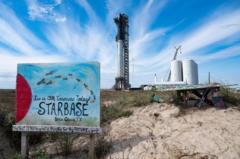Elon Musk's ambitious vision for a specialized hub in Texas took a significant step forward as the region surrounding his SpaceX operations officially transitioned into a municipality named Starbase. The initiative was approved by local residents during an election held on Saturday, with an overwhelming majority of the 283 eligible voters—mostly SpaceX employees—casting their ballots in favor of incorporation. With 212 votes supporting the measure compared to just six in opposition, Musk jubilantly announced via his social media platform X that "Starbase, Texas is now a real city!"
Covering approximately 1.6 square miles (3.9 sq km), the newly formed city was sparsely populated prior to SpaceX's land acquisition in the area starting in 2012. The governance of Starbase will be structured around a mayor and two commissioners who will oversee various local matters, including planning and taxation. However, this transition has not been without controversy; some vigilant residents have voiced concerns about the environmental implications stemming from SpaceX’s expanding presence.
The resident population is estimated at around 500, a number that could grow as more housing developments linked to SpaceX are anticipated. Initial city leadership will include Bobby Peden, a SpaceX vice president, who will step into the mayoral role unopposed, alongside two fellow SpaceX-affiliated commissioners. This structure positions Starbase as a Type C city, enabling it to impose property taxes up to 1.5%—a key change as decisions about local governance shift from Cameron County to the new city administration.
Currently, operations around SpaceX-related activities, such as highway closures during rocket launches, fall under county jurisdiction. However, a pending state bill could grant Starbase officials control over these restrictions, a development that may incite jurisdictional conflicts between Starbase and county authorities amid plans to ramp up launches from five to as many as 25 annually.
In recent years, Elon Musk has shifted his business interests from California to Texas, citing regulatory advantages and a favorable political climate. His companies, including X and Boring, have established new headquarters near Austin, moving away from his previous California operations. Comparatively, residential developments associated with these new endeavors have not kept pace with Starbase, where many workers still reside in nearby towns.
Environmental groups have raised alarms about the ecological effects of SpaceX's operations, highlighting issues such as light pollution and littering, with serious fines imposed after wastewater violations surfaced. However, Musk’s company has dismissed these penalties as bureaucratic discrepancies, maintaining adherence to environmental standards.
As Starbase embarks on this new chapter, the convergence of ambitious space exploration and community governance raises essential questions about sustainable development in areas poised for rapid industrial growth.
Covering approximately 1.6 square miles (3.9 sq km), the newly formed city was sparsely populated prior to SpaceX's land acquisition in the area starting in 2012. The governance of Starbase will be structured around a mayor and two commissioners who will oversee various local matters, including planning and taxation. However, this transition has not been without controversy; some vigilant residents have voiced concerns about the environmental implications stemming from SpaceX’s expanding presence.
The resident population is estimated at around 500, a number that could grow as more housing developments linked to SpaceX are anticipated. Initial city leadership will include Bobby Peden, a SpaceX vice president, who will step into the mayoral role unopposed, alongside two fellow SpaceX-affiliated commissioners. This structure positions Starbase as a Type C city, enabling it to impose property taxes up to 1.5%—a key change as decisions about local governance shift from Cameron County to the new city administration.
Currently, operations around SpaceX-related activities, such as highway closures during rocket launches, fall under county jurisdiction. However, a pending state bill could grant Starbase officials control over these restrictions, a development that may incite jurisdictional conflicts between Starbase and county authorities amid plans to ramp up launches from five to as many as 25 annually.
In recent years, Elon Musk has shifted his business interests from California to Texas, citing regulatory advantages and a favorable political climate. His companies, including X and Boring, have established new headquarters near Austin, moving away from his previous California operations. Comparatively, residential developments associated with these new endeavors have not kept pace with Starbase, where many workers still reside in nearby towns.
Environmental groups have raised alarms about the ecological effects of SpaceX's operations, highlighting issues such as light pollution and littering, with serious fines imposed after wastewater violations surfaced. However, Musk’s company has dismissed these penalties as bureaucratic discrepancies, maintaining adherence to environmental standards.
As Starbase embarks on this new chapter, the convergence of ambitious space exploration and community governance raises essential questions about sustainable development in areas poised for rapid industrial growth.


















